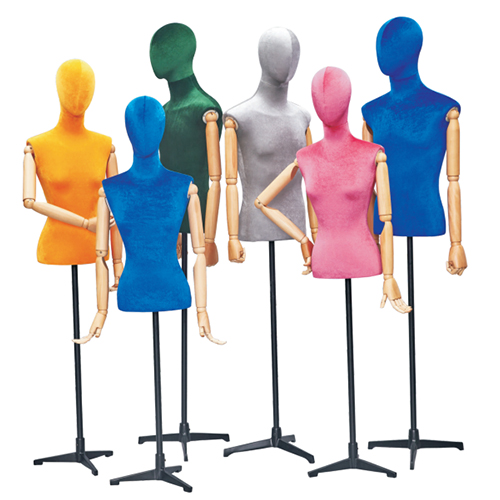
In Wuhan's shops and commercial streets, there used to be rows of large glass windows, standing on both sides of the long street like a public relations image, singing for social production and construction, and navigating people's material needs. After the commercial display props window of mannequins completed their historical mission, they gradually faded out of our sight. "Serving the Workers, Peasants and Soldiers - Exhibition of Photos Donated by Ma Jianxiong from Wuhan Art Museum of Old Wuhan Window (1950-early 1980s)" opened at the Wuhan Art Museum yesterday. More than 300 video works about the old shop windows in Wuhan were unveiled for the first time, evoking the memories of Wuhan citizens of their old days.
Tianyi flower cloth, Maoji leather shoes, looking for "Chinese products" in the old window
The window photos on display are all from the creation and collection of private collector Ma Jianxiong for nearly half a century. Among the commercial display props, Z makes him unforgettable. At the age of 19, he designed and displayed a window "Childhood" when he just started working, and later won the championship in the city's commercial art competition. "The design of this window uses contrasting techniques, using blue and cool backgrounds and props to set off the winter children's warm goods, and the plastic model compares the happy childhood of the old society with the miserable childhood of the old society. The front of the window has attracted a lot of customers to watch, and also received The praise from my peers made me excited for a few days."
Ma Jianxiong mentioned that supporting and helping the development of local products is a significant function of the display window. Therefore, clothing model manufacturers can often find Wuhan Tianyi Huabu, Haitang brand radio, Daqiao brand sewing machine, Maoji leather shoes, Baixiang in the old display window. Toothbrushes, lotus washing machines, Changjiang audio and other Wuhan brands are familiar to old Wuhan people.

When a new trend or a new product appeared in that year, it was often released on the window first. For example, as soon as the cups of Wuhan Huazhong Glass Factory were listed, there were commercial display props "Baidu boiling water, guaranteed not to explode". In the mid-1960s, enamel products began to replace ceramic products and iron products and entered the life of citizens. The window was filled with enamel pots and bowls. The merchants put the shape of the Xia chrysanthemum top bowl, known in the three towns, into the window. The old shop window is a kaleidoscope of "high-quality Chinese goods", and you can see many historical sections of the development of Wuhan's industries.
After salvaging a batch of old window images, Ma Jianxiong wrote an article about his personal experience of Wuhan window. Among them, he also pointed out the fact that the old window is a product of a specific historical period in our country, and bears too many social responsibilities to serve politics, economy, industrial and agricultural production, workers, peasants and soldiers. It cannot accomplish these missions just by displaying goods. It needs to draw on and integrate a variety of art forms, and it needs to keep up with politics and the times.
In the era of material scarcity, the window provides "fantasy"
"The theme of the exhibition proposed by the curator Gu Zheng, 'serving the workers, peasants and soldiers', reveals the problem we want to express through the exhibition. Commercial display props are the fake relationship between commodities and politics, and the people in a special era. In these real images, we will have a more real feeling of Wuhan from the 1950s to the 1980s, and even China's politics, economy, life, humanities, urban construction and other aspects." Liu Yu, Deputy Director of Wuhan Art Museum Say. In his view, this exhibition has restarted the sealed "window of culture". A number of photography experts also held discussions on the theme of "Visual Politics of Product Promotion" yesterday, discussing their understanding of the historical and artistic value of these old window photos.
Ding Zunxin, a photography art critic, believes that these are all very unique documentary photography works with double labels of commodity and politics. "It now seems that the various slogans in the window have nothing to do with the content of the displayed products. At that time, it was an era of extreme material scarcity. The window was a kind of fantasy supplier to a certain extent. Although it was encouraging, it was more Most of them play the role of whitewashing reality and lulling people's hearts."